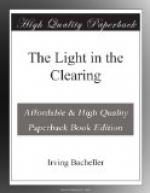Mr. Barnes put down the flat iron and picked up the poker and tried its strength on his knee as he told how he had heard that it was a growing country near the great water highway of the St. Lawrence. Prosperous towns were building up in it. There were going to be great cities in Northern New York. What they called a railroad was coming. There were rich stores of lead and iron in the rocks. Mr. Barnes had bought two hundred acres at ten dollars an acre. He had to pay a fee of five per cent. to Grimshaw’s lawyer for the survey and the papers. This left him owing fourteen hundred dollars on his farm—much more than it was worth. One hundred acres of the land had been roughly cleared by Grimshaw and a former tenant. The latter had toiled and struggled and paid tribute and given up.
Our cousin twisted the poker in his great hands until it squeaked as he stood before my uncle and said:
“My wife and I have chopped and burnt and pried and hauled rocks an’ shoveled dung an’ milked an’ churned until we are worn out. For almost twenty years we’ve been workin’ days an’ nights an’ Sundays. My mortgage was over-due, I owed six hundred dollars on it. I thought it all over one day an’ went up to Grimshaw’s an’ took him by the back of the neck and shook him. He said he would drive me out o’ the country. He gave me six months to pay up. I had to pay or lose the land. I got the money on the note that you signed over in Potsdam. Nobody in Canton would ‘a’ dared to lend it to me.”
The poker broke and he threw the pieces under the stove.
“Why?” my uncle asked.
Mr. Barnes got hold of another stick of wood and went on.
“‘Fraid o’ Grimshaw. He didn’t want me to be able to pay it. The place is worth more than six hundred dollars now—that’s the reason. I intended to cut some timber an’ haul it to the village this winter so I could pay a part o’ the note an’ git more time as I told ye, but the roads have been so bad I couldn’t do any haulin’.”
My uncle went and took a drink at the water pail. I saw by his face that he was unusually wrought up.
“My heavens an’ earth!” he exclaimed as he sat down again.
“It’s the brain colic,” I said to myself as I looked at him.
Mr. Barnes seemed to have it also.
“Too much note,” I whispered.
“I’m awful sorry, but I’ve done everything I could,” said Mr. Barnes.
“Ain’t there somebody that’ll take another mortgage?—it ought to be safe now,” my uncle suggested.
“Money is so tight it can’t be done. The bank has got all the money an’ Grimshaw owns the bank. I’ve tried and tried, but I’ll make you safe. I’ll give you a mortgage until I can turn ’round.”
So I saw how Rodney Barnes, like other settlers in Lickitysplit, had gone into bondage to the landlord.
“How much do you owe on this place?” Barnes asked.
“Seven hundred an’ fifty dollars,” said my uncle.




